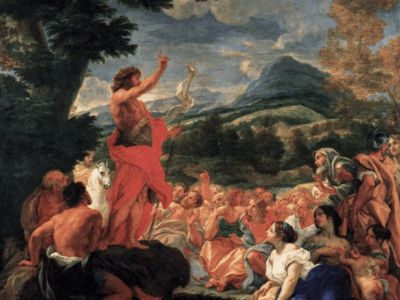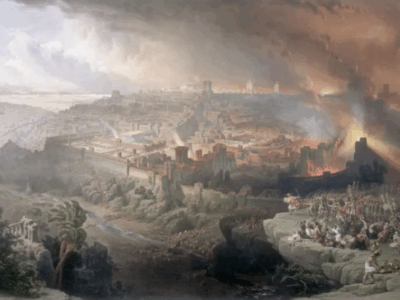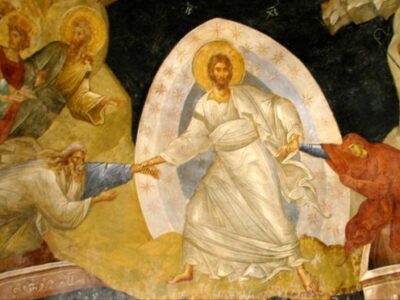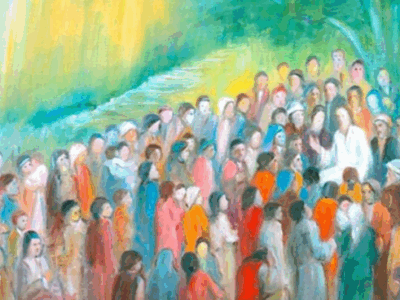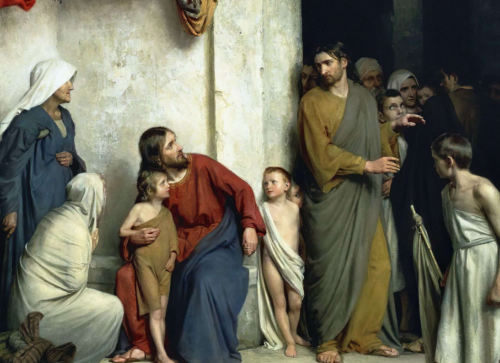
Hearty Seeded Bread
Year B
Joshua 24:1-2a,14-18
Psalm 34:15-22
Ephesians 6:10-20
John 6:56-69
May the words of my mouth O God… speak your truth…
What I hope you heard in this morning’s reading from Joshua… was that while Joshua said… As for me and my household… we will serve the Lord… the people had to decide whether they would serve the gods of their ancestors… the ones they served beyond the River… or the gods of the Amorites… in whose land they were living… ] or whether… in sincerity and faithfulness… they would serve YHWH…
What we didn’t hear today in the missing verses… vv. 2b – 13… was how the Amorites… the Perizzites… the Canaanites… Hittites… Girgashites… Hivites… and the Jebusites… were all… either killed by God… or handed over to the Israelites… so that they could inherit the land that God had promised them through Moses…
But if… for example… you’ve watched any of those Viking docudramas… you’ve no doubt heard those references to the old gods… and the new gods… ] even the apostle Paul… wrote in 1Corinthians 8:4… as to the eating of food offered to idols… we know that no idol in the world really exists… and that there is no God but one… ] because over the course of many hundreds of years… there was an emerging awareness among the Israelites that there was only one true God… and this was given expression in the Shema… Hear O Israel… the Lord our God… the Lord is One… and Joshua’s people said… far be it from us that we should forsake the Lord… to serve other gods…
Those who complied the lectionary readings… have repeated the final verses of last week’s Gospel… as the beginning two verses of this week’s… and because Jesus’ message is so important… he says that in order to gain eternal life… one had to eat his flesh and drink his blood… and many of his disciples said… This teaching is difficult… who can accept it…
Now the editors of the Jewish Annotated New Testament… suggest that the reasons this would have been abhorrent to the Jews… were because there were dietary prohibitions against ingesting the blood of any animal along with its meat… because it was too much like cannibalism… but even so… v. 53… which we heard last week… says that those who don’t eat his flesh and drink his blood… have no life in them… and v. 53 may refer to an ancient practice of theophagy… the ancient practice of eating one’s god…
In 1914… Preserved Smith… yes… that’s his real name… wrote A Short History of Christian Theophagy… and I just checked a few days ago… it’s still for sale on Amazon… and if we go back in time from Jesus… like how astronomers have used the Hubble and James Webb telescopes to look back in time to teach about the evolution of the universe… when we move back past the mystery cults of Demeter and Dionysus… back past incarnate gods… back past the earliest known scriptures… back past even any notion of a divine being who had human characteristics… the way the Greek gods did… when we go back to the earliest emergence of religion… Smith claims that the first expressions were totemism… not an idol… not a human-made god… but a thing that simply… subtly… represented the sacred… and connected the tribe to it… and it was through the totem… that primitive people sought assistance from and union with the divine…
But when the Jews said… This teaching is difficult… they were getting stuck on the surface level of understanding… but it’s as though Jesus said… I’m offering you the best that I’ve got… hearty… grainy… crusty… seeded warm organic bread… made from stoneground flour… right out of the oven… with lots of softened butter melting down into it… why would you eat Wonder bread with hydrogenated corn oil… why do you settle for bread that’s not real bread… and settle for life that’s not real life…
Jesus knew that when we eat spiritual food… when we make ourselves vulnerable to the body and blood of Christ… when we develop an inner disposition… that enables us to just touch the fringe of Jesus’ cloak… or drink the living water he brings… when we are reborn from above with a spiritual identity… that’s when the bread we eat will give us eternal life… that’s when we open ourselves to boundlessness… that’s when we empty ourselves into all that Christ is… and it’s that for which we were created…
But after six weeks of reading John’s Bread of Life discourse… which is what this series of passages is called… I have struggled to find fresh meaning in it… there’s only so much one can say about Jesus teaching the disciples that his invitation to eternal life… wasn’t physical immortality… . wasn’t living forever… but was spiritual unity with God… and that’s when the Spirit spoke to me… and in a roundabout way… brought me to baptism…
In the Episcopal church… we acknowledge seven sacraments… Reconciliation… Matrimony… Ordination… Unction… Confirmation… and Baptism and Communion… in the ELCA… we acknowledge two… Baptism and Communion… because they are the two practices that were (1) instituted by Christ… (2) involve tangible elements… such as water… or bread and wine… and (3) convey the promises of Grace… and over time… the church has changed the criteria for who could receive these sacraments… particularly communion… ] in the 19th and 20th centuries… you had to be both baptized and confirmed before you could receive… because confirmation was the rite of passage which bestowed full membership in the church… but in the 1970s and 1980s… both denominations recognized baptism as full initiation into the church…
In baptism… we make a public affirmation… or one is made on our behalf… that we can’t do it all on our own… that we are only human and will miss God’s mark for us… in baptism… we die to our small selves… and are reborn as members of the body of Christ… in baptism… we reject society’s message of self-sufficiency… that we could and should do it all on our own… in baptism… we acknowledge our willingness to be fed by God’s light and life and wisdom and forgiveness and grace… ] and where do we receive this nourishment… in the bread and the wine… in the body and the blood… it is the satisfying and spiritual equivalent of hearty… grainy… crusty… seeded… warm bread… And we too… are those to whom Joshua spoke… we are those who must continue to make choices between the old and the new… must decide what to let go of… and what to hold on to… and so we ask the question of each other… who will you and your household serve… and where will you go… to empty idols which give no life… or to the One whose Word gives eternal life… I think we know the answer…


